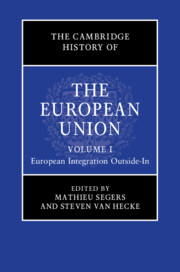Book contents
- The Cambridge History of the European Union
- The Cambridge History of the European Union
- The Cambridge History of the European Union
- Copyright page
- Contents
- Figures
- Contributors to Volume I
- Acknowledgements
- Abbreviations
- Reflections on the History and Historiography of European Integration
- Part I Critical Junctures
- 1 The Emergence of a Divided World and a Divisible West
- 2 European Integration and the Temporary Division of Germany
- 3 Europe, Decolonisation and the Challenge of Developing Countries
- 4 European Integration and Globalisation since the 1970s
- 5 A Europe of Reunification?
- 6 Moderately Failing Forward: The EU in the Years 2004–2019
- Part II Multilateralism and Geopolitics
- Part III Perspectives and Ideas
- Index
- References
1 - The Emergence of a Divided World and a Divisible West
from Part I - Critical Junctures
Published online by Cambridge University Press: 21 October 2023
- The Cambridge History of the European Union
- The Cambridge History of the European Union
- The Cambridge History of the European Union
- Copyright page
- Contents
- Figures
- Contributors to Volume I
- Acknowledgements
- Abbreviations
- Reflections on the History and Historiography of European Integration
- Part I Critical Junctures
- 1 The Emergence of a Divided World and a Divisible West
- 2 European Integration and the Temporary Division of Germany
- 3 Europe, Decolonisation and the Challenge of Developing Countries
- 4 European Integration and Globalisation since the 1970s
- 5 A Europe of Reunification?
- 6 Moderately Failing Forward: The EU in the Years 2004–2019
- Part II Multilateralism and Geopolitics
- Part III Perspectives and Ideas
- Index
- References
Summary
Before the Great War of 1914–18 ended, the successor states of four Eurasian empires split into conservative, liberal and revolutionary camps; ideological battles that had been waged for nearly a century were resumed like trench warfare in the streets of cities, in diplomatic salons, in the pages of broadsheets and in parliamentary halls. By the middle of the 1930s these ideological battles had again brought forth a civil war, this time in Spain, which came as an augury, tragic and bloody, conjoining the past, present and future in a grim garden of forking paths. This was the setting after the Second World War in which some western European nations sought to lay the basis for what would come to be called ‘an ever closer union’, whilst a rather different ‘union’ settled upon their eastern neighbours under Soviet rule. The processes of unification in eastern and western Europe were reactions and stimuli to the diminution of European power during the post-war period.
- Type
- Chapter
- Information
- The Cambridge History of the European Union , pp. 31 - 52Publisher: Cambridge University PressPrint publication year: 2023



